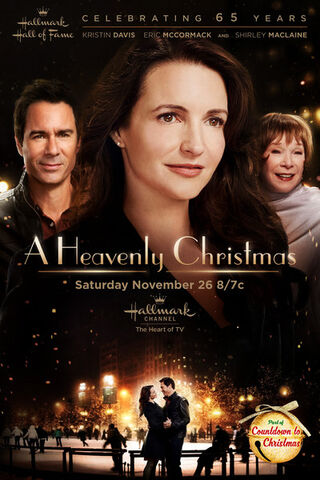Coronavirus Disease 2019
Why Are Christmas Movies More Popular Than Ever?
Even pre Covid-19, Christmas movies had become a soothing relief to many.
Posted November 28, 2020 Reviewed by Kaja Perina

It turns out Red and Green might actually be the new Black. Over the past several years, watching TV Christmas movies has become less of a pastime and more of an obsession for many of us. Why else would television destinations like Hallmark Channel be producing over 40 new holiday-themed movies this year—even during the pandemic, which has made it much tougher to produce these movies (many of which began airing before Halloween)?
Even pre Covid-19, Christmas movies had become a soothing “visual white noise” to many. Hallmark Channel Christmas movies have become such a cottage industry that other cable channels including Lifetime and Freeform have followed suit. Lifetime will premier 30 new Christmas movies this year while Freeform will continue with its annual 25 Days of Christmas viewing schedule.
As the life-altering effects of quarantining due to the coronavirus became a reality in the early spring, many people began making social media posts about displaying their Christmas decorations early (or leaving them out all year). There is definitely a familiarity about the Christmas season (no matter what date the calendar says it is) that seems to tame the savage beast—even for those who aren’t necessarily religious. In fact, Hallmark Channel began airing Christmas movies weekly beginning in the spring as a way to appease the demand of its yuletide-loving audience in need of a salve for the realities of the “new (hopefully temporary) normal.” Not to mention holiday movies are more often than not a form of entertainment the entire family can watch together.
While some are quick to pass such holiday offerings off as “fluff” and a recent call for more diversity in the lead characters in these types of movies is rightfully being addressed by the networks, there is a reason so many of these television movies resonate with their viewers and are watched again and again (even during Hallmark Channel’s “Christmas in July” presentation, which lasts for several weeks during the summer). Amidst the now-familiar stories of two lead characters “meeting cute” and then “accidentally falling in love” as they join forces to take on various Christmas traditions like decorating trees, making cookies and attending, participating in or even saving Christmas pageants, there can be genuine heart to be found—along with subtle and not-so-subtle reminders that there is joy waiting to be rediscovered in the everyday (even if it’s every day during the month of December).

For the sake of full disclosure, I must confess that as a screenwriter, I myself have helped to propel this seasonal phenomenon with a 2016 movie I wrote, the Hallmark Hall of Fame presentation of A Heavenly Christmas, which starred Kristin Davis, Eric McCormack and Shirley MacLaine. When pitching the initial concept of a newbie Christmas Angel who doesn't know much about Christmas to the network, I hadn’t prepared much else beyond the logline. To my surprise they responded enthusiastically and soon I was constructing the story of a wayward angel who learns about herself and her own shortcomings while trying to help an earth-bound potential love interest discover his.
When writing A Heavenly Christmas, my mother-in-law, Becky, was waging a brave battle against bone cancer. So I decided that she would inspire the inciting incident in the movie’s proceedings and created a character named Becky that Max, the male lead, lost in an accident (thus upending his music career and lust for life even as he was saddled with raising his sister Becky’s daughter). Enter overworked Eve, an expert on pretty much everything—except matters of the heart. When Eve takes a spill on ice that lands her in heaven, she’s quickly re-routed to earth where she must help Max rediscover his love of music, recommit to living and save his relationship with his niece (whose grandparents wanted her to relocate with them).

It’s all pretty familiar, right? And happily so. But by weaving my real-life experience of losing my own Becky into the story, I was able to add a layer of heart that permeates all the surface-y goings on. And at the end of the movie (spoiler alert!), as Eve and Max have both healed themselves and even fallen in love (despite that having been against the rules for Christmas Angels), we find out that it was the now-angelic Becky who put all of this into play in order to ensure her brother’s and her daughter's lasting happiness after her departure.
While most people watching A Heavenly Christmas, which I’m honored to report shattered ratings records on the channel, don’t know who the character of Becky is based on, the story still resonates. Many watching have their own “Becky story” in their lives. And for others, a reminder to rediscover the magic of falling snow or the memory of a first kiss can also be enough to help them get through another day.
So as we all face various battles, the unknown of the continuing pandemic and the ups and downs of life, we have Christmas movies to turn to for momentary respites amidst the chaos. Suffice it to say, our love of Christmas movies (whether year-round or simply seasonal) calls to mind the brilliant summation from the editors of New York’s Sun Times on September 21, 1897 when responding to an 8-year-old Virginia O’Hanlon’s heartfelt query, “No Santa Claus! Thank God! he lives, and he lives forever. A thousand years from now, Virginia, nay, ten times ten thousand years from now, he will continue to make glad the heart of childhood.” And so it seems will be true of all the feels we get from Christmas movies as well.


